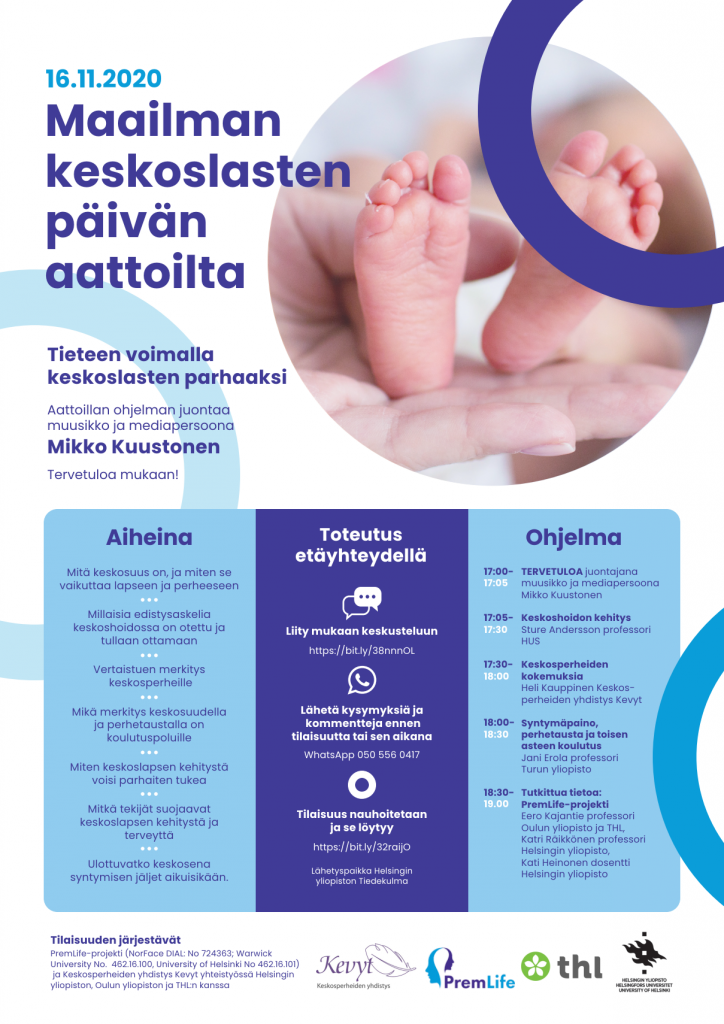For anyone interested in early-life health and well-being, there’s a very interesting online event (in Finnish) coming up on the eve of the World Prematurity Day.
Tune in on 16th of November at 17 o’ clock. Please see more info below!

For anyone interested in early-life health and well-being, there’s a very interesting online event (in Finnish) coming up on the eve of the World Prematurity Day.
Tune in on 16th of November at 17 o’ clock. Please see more info below!

A new study by Marius Lahti-Pulkkinen and others was recently published in the American Heart Association journal Hypertension. Quoting the press release:
“A Finnish study of 4,743 mother-child pairs found associations between hypertensive pregnancy disorders – including chronic hypertension (high blood pressure), gestational hypertension, preeclampsia and eclampsia – and childhood mental disorders. Preeclampsia is a common pregnancy complication often characterized by high blood pressure and protein in the urine, which indicates damage to other organs including the liver and kidneys. Eclampsia is a severe complication of preeclampsia in which high blood pressure during pregnancy results in seizures.”
Maternal preeclampsia and its severity were associated with an increase in the risk of any childhood mental disorder and psychological development and behavioral and emotional disorders in the offspring.
“While previous studies have shown significant effects of preeclampsia on ADHD, autism spectrum disorder and schizophrenia in the offspring, a novel aspect of our findings was that the predisposing effects of maternal preeclampsia extended to any childhood mental disorder in the offspring.”
“The findings emphasize the need for preventive interventions and treatments for maternal hypertensive disorders, since such interventions have the potential to benefit both the well-being of the expectant mother and her offspring [and] shed important new light on the etiology of childhood mental disorders. This information may help in targeting preventive interventions and support for families at risk, and aid clinicians in understanding issues and the underlying causes of childhood mental disorders.”
Read the full press release here!
In a study published in Biological psychiatry, Girchenko and others report that the children of mothers with higher levels of inflammation during pregnancy had a higher risk of child neurodevelopmental delay.
Additionally, maternal inflammation mediated the effects of prenatal environmental adversity on child neurodevelopmental delay.
The full press release is available here.
In a recent study we showed that the ɛ4 variant of APOE, the single most important gene for cognitive aging, was associated with dementia risk in 1453 elderly participants of the Helsinki Birth Cohort Study (HBCS), whereas regulatory variants linked with the transcriptional activity of the gene known as rs405509 and rs440446 was not. The study by Rantalainen et al is currently in press in Neurobiology of Aging.
The APOE gene has three common variants or isoforms, ɛ2, ɛ3 and ɛ4, which code for different variants of apolipoprotein E (apoE). The apoE protein performs multiple key functions in the central nervous system, and the ɛ4 isoform of the gene produces a functionally deficient form of the protein. The ɛ4 isoform of the gene has been found in numerous studies to be associated with a higher risk of dementia and Alzheimer’s disease (AD), and it has also been linked with lower performance in measures of normal cognitive functioning particularly in old age.
Other variants in the APOE gene have also been associated with the risk of dementia and AD. These include single-nucleotide polymorphisms that are involved in the regulation the gene’s activity of RNA transcription leading to production of the apoE protein. However, these associations have varied between studies according to the age and ethnicity of the study participants, and studies on the associations between these variants and normal cognitive functioning have been extremely scarce.
Our results replicate the well-documented finding regarding the dementia risk factor status of APOE ɛ4 in the HBCS cohort. Importantly, the new study complements a study published in the same journal in 2016 in which we found that the rs405509 and rs440446 regulatory variants were associated with cognitive ability in old age and with aging-related cognitive change, but the protein-coding ɛ4 isoform was not. Together these findings from a single study cohort suggest that in the HBCS the APOE gene may be associated with dementia and AD risk and aging-related cognitive change via at least partially distinct mechanisms: a protein isoform-dependent mechanism associated with risk of dementia and AD, and an isoform-independent mechanism associated with aging-related cognitive change.
In a study published recently in Pediatric Research, Girchenko and others found that children of mothers who were overweight or obese in early pregnancy were at a higher risk of developing self-regulation problems.
See the full press release on the publisher’s research news page here!
/Ville Rantalainen
 At the beginning of August Risto started as a doctoral student in Sleep and Mind group. Risto’s research will likely combine sleep EEG macro- and microstructure with endogenous factors of neural plasticity and cognitive performance, mainly overnight learning.
At the beginning of August Risto started as a doctoral student in Sleep and Mind group. Risto’s research will likely combine sleep EEG macro- and microstructure with endogenous factors of neural plasticity and cognitive performance, mainly overnight learning.
When young, Risto worked several years in software quality consultancy. While responsibilities with varying degree of technical and procedural challenges kept things hot, Risto’s increasing interest in human thought, emotion, behaviour and underlying physiological phenomena lead him to study psychology in University of Helsinki. Working as a research assistant in two research groups boosted Risto’s enthusiasm about data quality and his eagerness to contribute to creating new, reliable knowledge. Between master’s and doctoral studies Risto gathered clinical experience in HYKS child psychiatry.
Risto lives with his wife and 2- and 4-year-old nonstoppers. Risto enjoys books, high fidelity audio, good wines, simple exercise and riding his Kawasaki on a race track.
Lower cognitive ability in young adulthood was found to predict a higher risk of early-onset dementia among men from the Helsinki Birth Cohort Study in a study by Rantalainen and others, recently published in Neurology.
Men with lower cognitive ability scores at 20 years of age had a higher risk of receiving a diagnosis of dementia before 65 years of age, but not at later ages.
The associations were strongest with the total cognitive ability and verbal reasoning ability scores and were not explained by childhood socioeconomic status or maternal or early developmental factors. While lower arithmetic and visuospatial reasoning ability were also associated with a higher risk of early-onset dementia, these associations were weaker. However, the associations were not independent from the participant’s education, likely because cognitive ability and educational attainment are quite closely related.
Higher cognitive ability is thought to protect against dementia due to a more robust brain structure and learned cognitive skills and strategies that help preserve a higher-ability individual’s ability to function. The finding that cognitive ability predicted early-onset, but not late-onset dementia risk is likely related to heritable and non-heritable factors influencing cognitive ability to a different degree at different points in the lifespan, as individuals choose occupational, social and other environments according to their genetic predispositions.
/ Ville Rantalainen
Tuomas is a newish doctoral student in the Developmental Psychology Research Group. His research interests include genetic and environmental prenatal risk factors of mental health problems and in prenatal epigenetic programming.

At the moment Tuomas is practicing to work with genetic and epigenetic data and learning some new topics starting from the very basics. Previously Tuomas has completed a Master of Science in “paper and pen” kind of mathematics, and prior to starting his doctoral studies, Tuomas also worked as a research assistant in the Itu and Predo projects.
Tuomas likes to drink a lot of coffee. His hobbies include yoga, walking and jogging in nature, sauna, swimming, reading and good television shows.
A new study by Wolford et al. (2017) found that maternal depressive symptoms during pregnancy are highly stable and mothers with high depressive symptoms at the beginning of pregnancy have high depressive symptoms throughout pregnancy. Children of mothers with consistently high depressive symptoms during pregnancy had more ADHD symptoms and were almost three times more likely to have clinically significant ADHD symptoms at 3 to 6 years of age. In addition, maternal depressive symptoms after pregnancy added to the prenatal effect. Children whose mothers had high depressive symptoms both during and after pregnancy had the highest ADHD symptoms. The study was able to show that none of these associations were accounted for by a number of perinatal, maternal and neonatal characteristics, including maternal ADHD symptoms.
The study emphasizes the need to recognize the mothers at risk of depressive symptoms early in pregnancy and the need to study interventions for depression during pregnancy.
The study has been reported on in Helsingin Sanomat https://www.hs.fi/hyvinvointi/art-2000005520723.html (in Finnish) and in Medical News Today https://www.medicalnewstoday.com/articles/320538.php (in English).
/Elina Wolford
Being breastfed in infancy predicts higher cognitive ability in young adulthood and old age, and longer durations of breastfeeding may also be beneficial for change in cognitive ability over almost five decades, as reported in a study recently published in Psychological Medicine.
In the study Rantalainen and others found that in 931 men from the Helsinki Birth Cohort Study, those breastfed for any period of time was had higher cognitive ability scores at 20 and 68 years of age than those not breastfed, and the advantages were more pronounced the longer the duration of breastfeeding. These benefits were observed in all tested domains of cognition, including verbal, arithmetic and visuospatial reasoning, as well as the total cognitive ability score based on the three domains. Also, being breastfed for more than three months predicted positive aging-related change in verbal reasoning ability between 20 and 68 years of age.

At least two main mechanisms may account for the neurodevelopmental advantages of breastfeeding. Breastfeeding has been proposed to support sensitive interactions with the mother, promoting the development of the infant’s self-regulation capabilities. Alternatively, breast milk may contribute to the infant’s neural development, as it is an ideal source of essential fatty acids.
Numerous studies have reported that those breastfed in infancy have a higher cognitive ability in childhood and adolescence than those not breastfed, and a handful of studies have found a similar advantage in adulthood. The new finding suggests that the benefits of breastfeeding can persist to old age, especially with longer durations, and potentially contribute to the accumulation of skills and experience related to verbal ability over the lifespan.
/ Ville Rantalainen